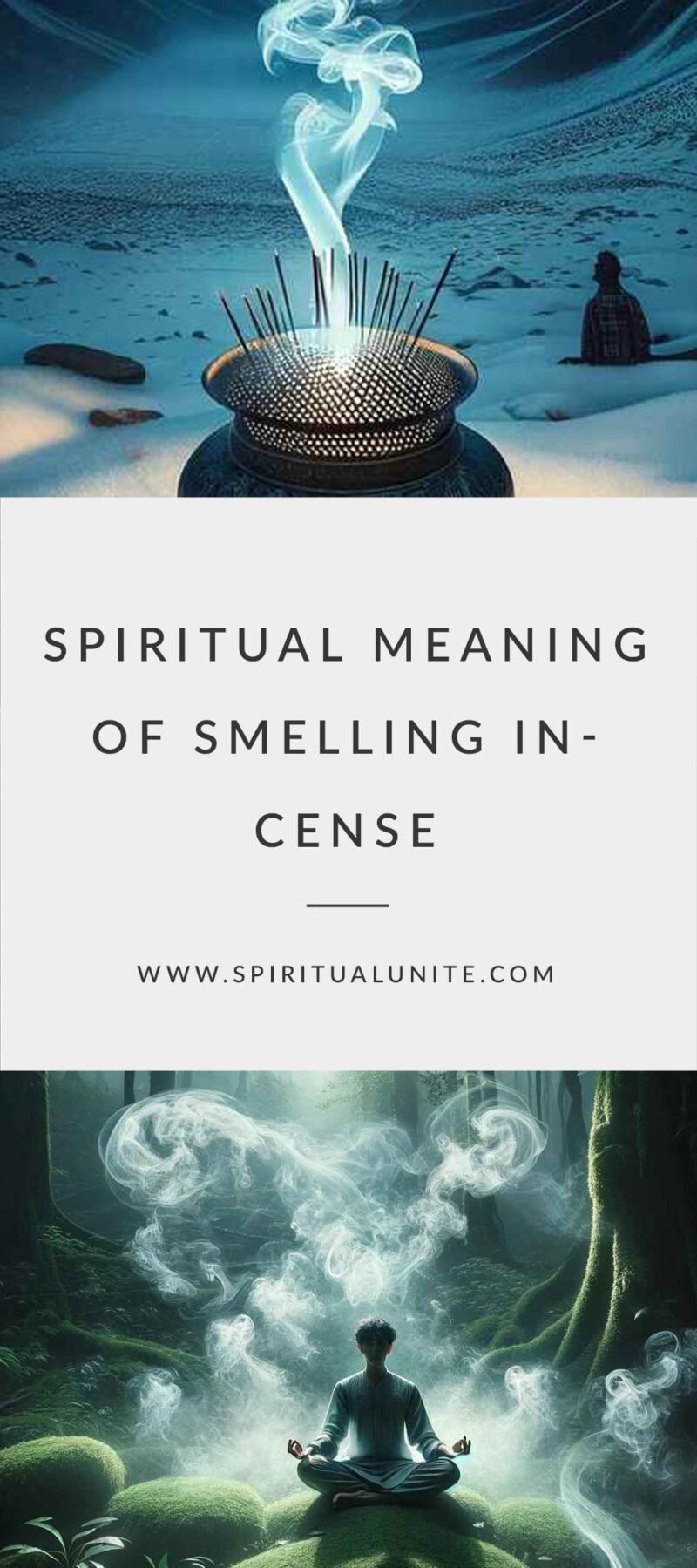Spiritual Meaning of Smelling Incense: Unlock the Mysteries
Introduction:
Ever wondered about the spiritual meaning of smelling incense? This intriguing question taps into a world of mystery and spirituality.
Whether it’s a sudden whiff or a deliberate practice, the experience of smelling incense can be deeply symbolic and meaningful.
Key Takeaways:
- Diverse Interpretations: The meaning varies across different cultures and spiritual traditions.
- Personal Significance: Individual experiences and feelings play a crucial role in interpreting the scent.
- Symbolic Representations: Often represents prayer, divine presence, or spiritual awakening.
- Context Matters: The setting and circumstances influence the interpretation.
- Spiritual Connection: Acts as a bridge between the physical and the spiritual realms.
Spiritual Meaning of Smelling Incense:
At its core, smelling incense often signifies a deep spiritual presence or an awakening of the senses to something beyond the physical realm.
It can signal a moment of clarity, a divine message, or a call to introspection and meditation.

Scenarios Involving Incense
- In a Religious Ceremony: Symbolizes prayers rising to the divine.
- During Meditation: Represents the journey inward and spiritual exploration.
- In a Dream: Might indicate guidance or a message from a higher power.
- Unexpectedly in Daily Life: Could signify a spiritual presence or reminder.
- In Times of Stress: Offers comfort and a sense of divine support.
- While Reading or Studying Sacred Texts: Enhances connection with the divine wisdom.
- During Moments of Joy: Celebrates spiritual blessings and gratitude.
- At the Start of a New Venture: Symbolizes blessings and good wishes.
Various Scenarios/Circumstances:
- Home Rituals: Enhancing the sacred space of your home with incense can invite spiritual energies and tranquility.
- Nature Settings: Using incense outdoors can symbolize a connection with the natural world and its spiritual aspects.
- Healing Practices: In holistic healing, incense is often used to cleanse the aura and facilitate spiritual healing.
- Cultural Festivals: Many cultures use incense in festivals to honor deities or ancestors, highlighting its spiritual significance.
- Transitional Moments: Burning incense during life changes can represent spiritual support and guidance.
- Creative Processes: Artists and writers sometimes use incense to inspire spiritual creativity and deeper connection with their work.
Specific Scenarios
- Experiencing Loss: The smell of incense during times of grief can offer a sense of spiritual comfort and a reminder of the eternal soul.
- Seeking Answers: When at a crossroads, the scent of incense might signify divine guidance or introspection.
- Celebrating Milestones: In moments of achievement or celebration, incense can represent gratitude and acknowledgment of spiritual support.
- Spiritual Awakening: Encountering incense during a period of spiritual growth can symbolize progress and enlightenment.
8 Spiritual Symbolism of Smelling Incense
1. Divine Presence
The scent of incense is often associated with the divine presence, offering a tangible symbol of the spiritual realm intersecting with our physical world.
In many spiritual practices, the act of burning incense is akin to summoning the divine, creating an atmosphere conducive to experiencing a higher power’s presence.
It’s not just about the fragrance; it’s about the act itself, which transcends the ordinary and elevates a moment or a place into something sacred.
Whether it’s in a temple, a church, a home, or any space dedicated to spiritual practice, the aroma of incense signifies that one is in the presence of something greater, something beyond the scope of our everyday experiences.
This association is deeply ingrained in human consciousness, spanning across various religions and spiritual beliefs.
2. Cleansing and Purification
Incense plays a crucial role in cleansing and purification rituals. The smoke from burning incense is believed to have the power to clear negative energy and purify a space, object, or person.
This practice is found in numerous cultures and spiritual traditions, where incense is used in ceremonies to cleanse the soul, sanctify a place, or prepare an individual for a spiritual experience.
The act of burning incense symbolizes the transformation of the physical material into the ethereal, mirroring the process of purification where the impure is converted into the pure.
The fragrant smoke acts as a medium for this transformation, creating an environment conducive to spiritual cleansing and renewal.

3. Prayer and Meditation
Incorporating incense into prayer and meditation enhances the spiritual experience. The act of lighting incense and observing the rising smoke can be a meditative practice in itself, symbolizing the ascent of prayers to the divine.
The aroma helps in focusing the mind, fostering a sense of inner peace and making it easier to enter a meditative state.
For many, the scent of incense is a trigger that prepares the mind and body for prayer and meditation, creating a boundary between the mundane and the sacred.
It serves as a sensory reminder of the intention to connect with the spiritual realm, whether seeking guidance, offering gratitude, or simply engaging in quiet reflection.
4. Sacred Space
The use of incense is integral in creating and maintaining a sacred space. The act of burning incense can transform an ordinary room into a sanctuary for spiritual practices.
It marks the space as different, set apart from the daily routine, dedicated to reflection, prayer, or other spiritual activities.
The fragrance of the incense contributes to the atmosphere, making the space feel serene, purified, and conducive to spiritual pursuits.
In many traditions, lighting incense is the first step in any ritual, symbolizing the entry into a sacred realm and preparing the environment for spiritual work.
5. Offering and Devotion
Burning incense as an offering is a common practice in many spiritual traditions. It’s a way to show devotion, respect, and reverence to a deity, the divine, or the spiritual realm.
The act of offering incense can be a personal gesture of faith and commitment or part of a larger ceremonial practice.
The rising smoke is often seen as a symbol of the prayers and intentions of the devotee reaching the heavens.
This practice underscores the act of giving something of value, in this case, the incense and the act of burning it, as a sign of dedication and devotion.
6. Transformation and Transcendence
Incense symbolizes transformation and transcendence. The process of burning, where a solid substance is transformed into fragrant smoke, mirrors spiritual transformation.
It’s a metaphor for personal growth and enlightenment, where the physical, earthly self transcends into a higher state of being.
The act of burning incense can signify the burning away of impurities and the rising of the soul towards enlightenment.
It’s a physical representation of a spiritual journey, underscoring the idea that through transformation, one can reach a state of higher understanding and spiritual awakening.
7. Connection to Ancestors
In many cultures, incense is used to honor and connect with ancestors. The smoke is believed to carry messages to the spirit world, bridging the gap between the living and the deceased.
Burning incense during memorial services or on special days dedicated to remembering ancestors is a way to pay respect and keep their memory alive.
The fragrance serves as a reminder of the past, a symbol of the ongoing bond between generations, and a means to express gratitude and reverence for those who have passed on.
8. Symbol of Timelessness
The aroma of incense is often a symbol of timelessness. Its use in spiritual practices dates back thousands of years, creating a link between the past, present, and future. The enduring nature of incense in religious and spiritual ceremonies across the globe speaks to its universal appeal and significance.
It transcends cultural and temporal boundaries, connecting us to a long line of human history and spiritual exploration.
The timeless quality of incense reminds us of the enduring nature of spirituality itself, a constant in the ever-changing flow of human existence.

Biblical Insights: Smelling Incense’s Spiritual Meaning
The use of incense in the Bible is significant, often associated with worship, prayer, and the presence of God. Biblical references to incense include its use in the
Tabernacle and Solomon’s Temple, symbolizing the prayers of the saints ascending to heaven.
This biblical context provides a deep understanding of the spiritual meaning of incense, connecting it to divine worship and the sacred.
Incense Across Cultures: Spiritual Significance
The spiritual significance of incense varies across different cultures, yet it holds a universal appeal.
In Hinduism, it’s used in puja ceremonies; in Buddhism, to purify the surroundings; and in Native American traditions, for cleansing and healing.
This cross-cultural use of incense highlights its universal role as a connector between the physical and spiritual worlds.
Dreams and Incense: Mystical Interpretations
Dreams involving the scent of incense often carry mystical interpretations. They can signify spiritual messages, guidance, or a heightened state of awareness.
Analyzing these dreams requires understanding the context and personal associations with incense, offering insights into one’s spiritual journey.
Scented Spirituality: Incense’s Meaning Unveiled
The scented spirituality of incense involves more than just its pleasant aroma.
It represents a sensory approach to spirituality, where the act of smelling incense can trigger deeper spiritual experiences and connections.
Fragrant Power: Incense’s Spiritual Influence
The fragrant power of incense extends beyond its scent.
It influences the atmosphere, mood, and spiritual state of a space or individual. Its fragrance has the power to evoke memories, emotions, and spiritual connections.

Sacred Practices: Incense’s Role in Spirituality
In many sacred practices, incense plays a crucial role.
It’s used in rituals, ceremonies, and daily spiritual exercises as a tool to enhance spiritual awareness, focus the mind, and create a sacred atmosphere.
Incense on the Spiritual Journey: Aromatic Path
For those on a spiritual journey, incense can be a significant part of their practice.
Its aromatic path offers a sensory dimension to spiritual exploration, aiding in meditation, prayer, and personal rituals.
Spiritual Significance of Incense’s Fragrance
The spiritual significance of incense’s fragrance is profound. It can signify purity, transformation, divine presence, and spiritual awakening, making it a powerful element in spiritual practices.
Incense and the Spiritual Realm: A Gateway
Incense is often seen as a gateway to the spiritual realm. Its smoke symbolizes the connection between the physical and spiritual worlds, offering a medium for communication and interaction with the divine.
Incense’s Enigmatic Presence: A Spiritual Connection
The enigmatic presence of incense in spiritual practices creates a unique connection. It’s an element that intrigues, inspires, and connects individuals to a deeper spiritual reality.
Aromatic Experiences: Incense and the Divine
Aromatic experiences with incense are more than sensory pleasures.
They offer a route to the divine, serving as a tool for spiritual exploration and connection.
Sacred Space: Incense in Ceremony and Prayer
In many religious ceremonies and prayers, incense is used to create a sacred space. It sanctifies the area, making it conducive for spiritual practices and divine encounters.
Additional Questions About The Scent of Incense
- How does the scent of incense differ in various spiritual traditions, and what does this say about cultural interpretations of spirituality?
- The scent of incense varies significantly across different spiritual traditions. In some cultures, specific fragrances are chosen for their symbolic meanings or spiritual properties. For example, frankincense is often used in Christian ceremonies for its biblical significance, while sandalwood might be favored in Hindu rituals for its purifying properties. These variations in scent reflect the diverse ways cultures interpret and practice spirituality, highlighting the rich tapestry of beliefs and rituals that define human spiritual experience.
- Can the use of incense in daily life enhance one’s spiritual well-being, and if so, how?
- Integrating incense into daily life can significantly enhance one’s spiritual well-being. Its fragrance can create a calming and focused environment, conducive to meditation and reflection. Regular use of incense can establish a routine that signals the mind and body to enter a state of tranquility and mindfulness, thus contributing to overall spiritual health. Additionally, the act of burning incense can serve as a symbolic gesture of setting intentions, expressing gratitude, or simply acknowledging the spiritual aspect of one’s life.
- What role does incense play in connecting with one’s inner self and intuition?
- Incense can play a pivotal role in connecting with one’s inner self and intuition. The act of lighting incense and focusing on its fragrance can be a meditative practice, aiding in quieting the mind and fostering introspection. This can open pathways to deeper self-awareness and strengthen intuition. The ritual of burning incense can also serve as a moment of pause in a busy day, allowing individuals to reconnect with their inner thoughts and feelings, and tap into their intuitive wisdom. This connection is often facilitated by the calming and grounding effects of incense, which can help in filtering out external noise and focusing on the inner voice.
- How can understanding the symbolism of incense enhance spiritual practices?
- Understanding the symbolism of incense can significantly enhance spiritual practices by adding layers of meaning and intention. Knowing that incense symbolizes purification, divine presence, or prayer, for instance, can deepen the significance of a ritual or meditative practice. This awareness transforms the act of burning incense from a mere routine into a meaningful spiritual exercise, where each scent and its associated symbolism contribute to a more focused and intentional practice. Additionally, this understanding can foster a deeper connection with the spiritual traditions and rituals that have used incense throughout history, enriching one’s own spiritual journey.

Why Did I Experience a Spiritual Awakening with Incense?
- Sensory Stimulation: The unique fragrance of incense can stimulate the senses in a way that opens up new spiritual insights and awareness. The distinct scents can trigger deep emotional responses, memories, and subconscious connections, facilitating a spiritual awakening.
- Symbolic Significance: Understanding the symbolic meanings associated with different types of incense can lead to a profound realization of their spiritual importance. This deeper understanding can trigger a spiritual awakening, as one begins to see and experience the world through a more spiritual lens.
Action to Take
What can you take from this article?
- Incorporate Incense into Daily Rituals: Regularly using incense can help create a peaceful, sacred space in your home, aiding in meditation and reflection.
- Reflect on Personal Beliefs: Use the knowledge of incense’s symbolism to explore and deepen your own spiritual beliefs and practices.
- Mindful Use of Incense: Approach the use of incense mindfully, focusing on its spiritual significance and the intentions behind its use.
Conclusion
In exploring the spiritual meaning of smelling incense, we’ve journeyed through its diverse cultural and historical significance.
From divine presence to connecting with ancestors, incense serves as a powerful symbol in various spiritual practices.
Understanding its symbolism offers a deeper appreciation and a more profound experience in our spiritual pursuits.
Whether used in daily rituals or special ceremonies, the fragrance of incense continues to be a timeless gateway to the spiritual realm.
FAQs
- Is the spiritual meaning of incense universal across all cultures?
- While incense is used universally in spiritual practices, its specific meaning and symbolism vary significantly across different cultures and traditions.
- Can incense have negative spiritual connotations?
- In some beliefs, certain types of incense or the way it’s used can have negative connotations. It’s essential to understand the context and cultural background of incense use.
- How can I choose the right incense for my spiritual practice?
- Choosing the right incense can depend on personal preference, the intention behind its use, and sometimes, the guidelines of a specific spiritual or cultural tradition.
- Is it possible to have a spiritual experience with incense even if I’m not religious?
- Yes, many people experience a sense of peace, mindfulness, or spiritual awakening with incense, regardless of their religious beliefs. It’s more about the personal connection and intention behind its use.







